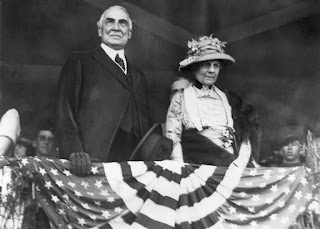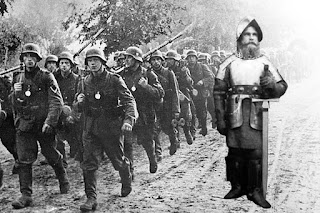How World War One Officially Ended on the Site of a New Jersey Burger King and the Surprising Rise and Fall of Warren G. Harding
On the afternoon of July 2, 1921 the 29th President of the United States, Warren G. Harding, is playing a round of golf at the Raritan Valley Country Club in Raritan, New Jersey, with his friend and political ally, New Jersey Senator Joseph Frelinghuysen.
Harding, a former Republican Senator from Ohio, in July of 1921 is, at that time, one of the most popular Presidents in American history. A friend of the President’s once noted that, “Harding used his oratory to good effect; it got him elected, making as few enemies as possible in the process.”
During his political career spanning over three decades, he has become well known for adeptly working together with members on both sides of the political aisle.
After Harding’s election to the Senate in 1914 the First World War launched him onto the national political stage. The Republican Harding used his renowned speaking skills to gain support among both politicians and the American public for then Democratic President Woodrow Wilson’s resolution declaring war on Germany and Austria-Hungary that marked America’s entrance into the Great War in April of 1917.
During the course of the war, Harding was always keen to argue in favor of granting President Wilson broad and sweeping, almost dictatorial powers. Harding was a leading lobbyist for passage of the Espionage Act of 1917 which severely curtailed the civil liberties of all Americans during wartime.
 |
| Frelinghuysen Mansion, Raritan, NJ 1921 |
In November of 1918, only a week before the signing of the armistice that ended World War One, Harding won reelection to his Senate seat and the Republicans narrowly took control of Congress after the midterm elections. After his re-election Harding was appointed to lead the Senate Foreign Relations Committee.
In early 1919 President Woodrow Wilson traveled to attend the Paris Peace Conference at Versailles where allied leaders set the terms for peace with Germany and sought reparations from the defeated states of the Central Powers. Wilson, who had a vision all his own on how to “Make the world safe for democracy” after the carnage of the First World War, neglected to take any members of the Senate Foreign Relations Committee, or any Congressmen at all for that matter, with him to Paris to participate in the peace treaty proceedings.
 |
| President Wilson in Paris in 1919 |
This perceived snub infuriated Harding and other Republicans in Congress. In June of 1919 Wilson returned to the United States seeking ratification from both the House of Representatives and the Senate for the Treaty of Versailles which had already been adopted by all of the victorious European nations and not only established peace with Germany but also called for the formation of a League of Nations to ensure continued world peace, a sort of precursor to the post World War Two United Nations Charter which would be adopted in 1946.
At first, the American public is overwhelmingly in support of ratifying the Treaty of Versailles. Most Americans initially see Wilson as a hero; as the man who led them to victory over the evil Kaiser, and made the future safe for democracy.
But, when Wilson invites the members of the Senate Foreign Relations Committee, Warren G. Harding foremost among them, to discuss the Treaty, Harding promptly drafts a letter signed by almost all of the Republicans in Congress, criticizing and denouncing what Wilson has done in France. Harding is an outspoken critic of The League of Nations, which he fears will draw the United States into unwanted foreign entanglements, and he is particularly wary of Article X of the Treaty of Versailles, which he says appears to take the power to declare war out of the hands of the United States Congress, and places it instead into the hands of foreign powers in the form of the League of Nations.
Debate in Congress over whether or not to ratify the Treaty of Versailles is fierce. Public opinion, weary of war and foreign involvement, begins to sway against the idea of a League of Nations in particular and against the policies of internationally minded President Woodrow Wilson in general.
In November 1919, and once again in March 1920, led by the outspoken Warren G. Harding, the Republican controlled Congress, voted against ratification of the Treaty of Versailles.
Just prior to the Senate’s vote on the Treaty of Versailles President Wilson suffered a debilitating stroke which made him ostensibly a lame duck figurehead for the rest of his term.
Harding, through a combination of isolationist sentiment at home, and a barnstorming high energy campaign, that the press dubbed Harding’s, “Front Porch Campaign” because of its grass-roots involvement and the way in which it resonated with ordinary Americans was able to ride a wave of popularity to the Presidency in November of 1920. Technically, even as Harding was being sworn into office over two full years after the guns had fallen silent on the Western Front, a state of war still existed between the United States and Germany.
 |
| Harding Signs the Knox-Porter Resolution |
Now, while the new President is on vacation in New Jersey and visiting his long time friend Senator Frelinghuysen, just as the two men are about to tee off on the back nine a courier, who has only moments before arrived in New Jersey via express train from Washington D.C., hurriedly runs up to the President and the Senator carrying a copy of what history now calls the Knox-Porter Resolution.
After not having ratified the Treaty of Versailles on two separate occasions in 1919 and 1920, as Democratic Senator from Mississippi Ross Collins stated, “with the exception of the United States of America, all of the nations that were at war with the Central Powers are now at peace with them. This country alone remains in a state of war...the people in all parts of our nation are hungry for actual peace.”
Out of this desire to make a separate, and official peace with Germany, the Knox-Porter Resolution was born. The Resolution was drafted by two Republicans from Pennsylvania, Philander Knox and Stephen Porter (hence its name) and then hurriedly pushed through Congress.
Less than twenty-four hours before Harding and Frelinghuysen teed off at the Raritan Valley Country Club, on July 1, 1921, Congress had ratified the Knox-Porter Resolution between the United States, Germany and Austria-Hungary.
The official history of the proceedings of the United States House of Representatives states regarding the Knox-Porter Resolution that, “It did not repeal that state of war between the United States and Imperial Germany, but rather, declared the state of war to be at an end.”
In effect, the Knox-Porter Resolution was simply an official continuation and recognition of the unofficial armistice signed by Germany with the allied powers in November 1918 that ended the fighting in the First World War. The American resolution made no mention of an international peace treaty, a league of nations or of any reparations to be paid by Germany.
Republicans in Congress state when they ratify the Knox-Porter Resolution that, “We ask only for a just, equitable and honorable disarmament, no less and no more. We ask only for a just and honorable peace.”
Harding and Frelinghuysen stop their golf game mid-stream as the courier approaches with a copy of the expected resolution.
“President Harding,” the courier says, “this matter requires your urgent attention.”
The President, Senator Frelinghuysen the courier from Washington and the rest of Harding’s entourage rush across the street to the Frelinghuysen family mansion, where Harding, along with a handful of witnesses signs the Knox-Porter Resolution in the front drawing room of the Frelinghuysen family mansion in Raritan, New Jersey, on July 2, 1921, officially ending the First World War on behalf of the United States.
After Warren G. Harding affixes his signature to the document in the form of an enormous G followed by his last name, both he and Senator Frelinghuysen promptly walk back across the street to the Raritan Valley Country Club and complete their round of golf.
 |
| Plaque Commemorating where WW1 Ended for the U.S. |
Today, the spot where the First World War officially ended between the United States and Germany is marked by a small plaque framed by two eight foot tall stone pillars on the side of the road off of New Jersey Route 28 in Raritan.
It is less than one hundred feet from the entrance to a Burger King and a strip mall that contains an electronics store. Thousands of New Jersey motorists pass this spot each day, though few, if any, ever bother to stop and take a look at the nondescript plaque since it is so small and inconspicuous as to be barely noticeable, really, from the highway.
The Frelinghuysen family would move out of their Raritan mansion in the 1930’s as that part of New Jersey became more urbanized and too populated for their liking. The building where the First World War officially ended on July 2, 1921 would burn to the ground in 1947 and eventually a Burger King would be built right over the spot where the mansion once stood.
Warren G. Harding would die unexpectedly of cardiac arrest only two years later in July of 1923 while still in office. In the century to come the once overwhelmingly popular President’s reputation would be irrevocably tarnished when it came to light that for years he carried on an illicit, extramarital affair with his attractive younger secretary Nan Britton while in office both as a Senator from Ohio and as President of the United States, even fathering a child with his mistress, which of course was hidden from the public, while he was in office.
 |
| Nann Britton the Mistress of Warren G. Harding |
The Presidency of Warren G. Harding, just like an inconspicuous fast-food restaurant in Raritan, New Jersey, is proof that sometimes everything in history is not exactly as it would appear.




I always love reading about history! It's so nice to read short snapshots of certain perspectives or areas that we don't learn about in school! Also nice to see someone who clearly loves history and wants to share their knowledge
ReplyDelete